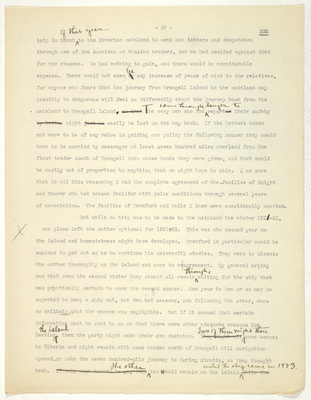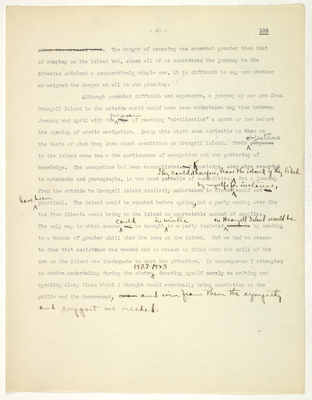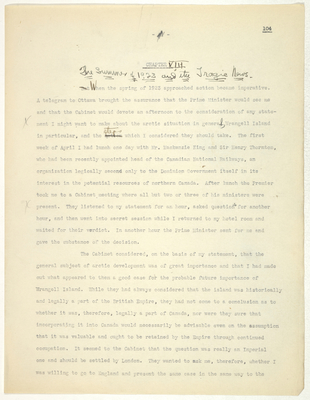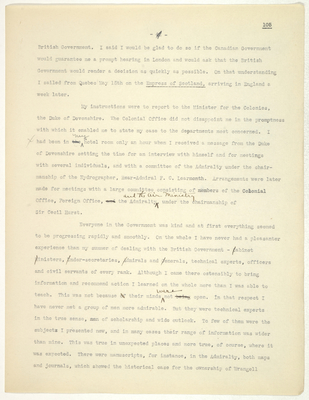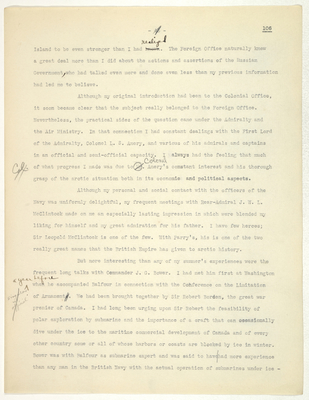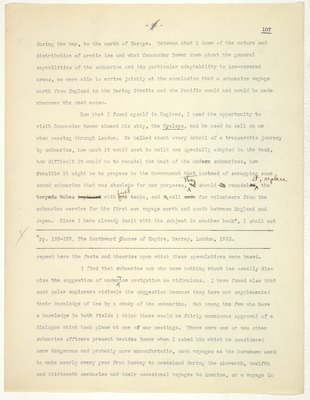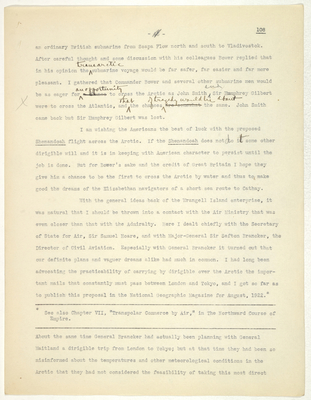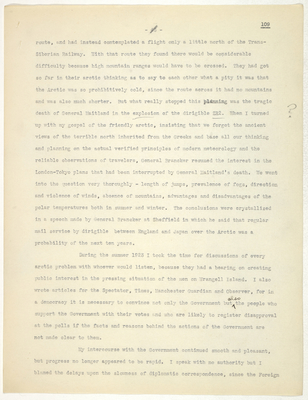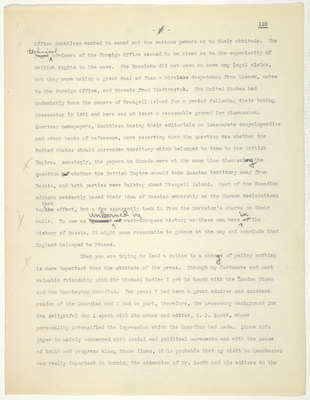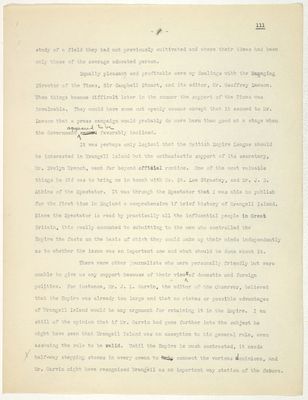Pages That Need Review
stefansson-wrangel-09-27
stefansson-wrangel-09-27-070
- 39 - 102
trip in March of that year to the Siberian mainland to send out letters and despatches through one of the American or Russian traders, but we had decided against that for two reasons. We had nothing to gain, and there would be considerable expense. There would not even be by any increase of peace of mind to the relatives, for anyone who fears that the journey from Wrangell Island to the mainland may possibly be dangerous will feel no differently about the journey back from the mainland to Wrangell Island. so that The very men who had come through danger to reported their safety by letter might just as easily be lost on the way back. If the letters taken out were to be of any value in guiding our policy the following summer they would have to be carried by messenger at least seven hundred miles overland from the first trader south of Wrangell into whose hands they were given, and that would he costly out of proportion to anything that we might hope to gain. I am sure that in all this reasoning I had the complete agreement of the families of Knight and Maurer who had become familiar with polar conditions through several years of association. The families of Crawford and Galle I knew were considerably worried.
But while no trip was to be made to the mainland the winter 19221-22, our plans left the matter optional for 1922-23. This was the second year on the island and homesickness might have developed. Crawford in particular would be anxious to get out so as to continue his university studies. They were to discuss the matter thoroughly on the island and come to anagreement. My general urging was that even the second winter they should all remain through, waiting for the ship that was practically certain to come the second summer. One year in ten or so may be expected to keep a ship out, but two bad seasons, one following the other, were so unlikely that the chance was negligible. But if it seemed that certain information must be sent to me or that there were other adequate reasons for, leaving the island, then the party might make their own decision. They might all Two of them might [there] come across to Siberia and might remain with some trader south of Wrangell till navigation opened,or make the seven hundred-mile journey to Bering Straits, as they thought best. If only some wanted to go, then The other two cwould remain on the island until the ship came in 1923. while the
stefansson-wrangel-09-27-071
- 40 - 103
other two crossed over. The danger of crossing was somewhat greater than that of staying on the island but, since all of us considered the journey to the Siberian mainland a comparatively simple one, it is difficult to say now whether we weighed the danger at all in our planning.
Although somewhat difficult and expensive, a journey by our men from Wrangell Island to the outside world could have been undertaken any time between January and April with the purpose hope of reaching "civilization" a month or two before the opening of arctic navigation. Doing this might seem advisable to them on the basis of what they knew about conditions on Wrangell Island. Their objectives purposes in the island were two - the continuance of occupation and the gathering of knowledge. The occupation had been accomplished. and kKnowledge even when recorded in notebooks and photographs, is the most portable of commodities. They could, therefore, leave the island if they liked. But a journey from the outside to Wrangell Island similarly undertaken in winter by myself, for instance, would not to have been practical. The island could be reached before spring, but a party coming over the ice from Siberia could bring to the island no appreciable amount of supplies. The only way in which succor could can be brought in winter to a party isolated on Wrangell Island would be there is by sending in a hunter of greater skill than the ones on the island. But we had no reason to fear that assistance was needed and no reason to think that the skill of the men on the island was inadequate to meet the situation. In consequence I attempted no active undertaking during the winter 1922-1923, devoting myself merely to writing and speaking along lines which I thought would eventually bring conviction to the public and the Government, wau and win from them the sympathy and support we needed.
stefansson-wrangel-09-28
stefansson-wrangel-09-28-001
- [1] -104
CHAPTER VIII
The Summer of 1923 and the Tragic News.
But When the spring of 1923 approached action became imperative. A telegram to Ottawa brought the assurance that the Prime Minister would see me and that the Cabinet would devote an afternoon to the consideration of any stateX ment I might want to make about the arctic situation in general, Wrangell Island in particular, and the action steps which I considered they should take. The first week of April I had lunch one day with Mr. Mackenzie King and Sir Henry Thornton, who had been recently appointed head of the Canadian National Railways, an organization logically second only to the Dominion Government itself in its interest in the potential resources of northern Canada. After lunch the Premier took me to a Cabinet meeting where all but two or three of his ministers were X present. They listened to my statement for an hour, asked questions for another hour, and then went into secret session while I returned to my hotel room and waited for their verdict. In another hour the Prime Minister sent for me and gave the substance of the decision.
The Cabinet considered, on the basis of my statement, that the general subject of arctic development was of great importance and that I had made out what appeared to them a good case for the probable future importance of Wrangell Island. While they had always considered that the island was historically and legally a part of the British Empire, they had not come to a conclusion as to whether it was, therefore, legally a part of Canada, nor were they sure that incorporating it into Canada would necessarily be advisable even on the assumption that it was valuable and ought to be retained by the Empire through continued occupation. It seemed to the Cabinet that the question was really an Imperial one and should be settled by London. They wanted to ask me, therefore, whether I was willing to go to England and present the same case in the same way to the
stefansson-wrangel-09-28-002
105
- 42 -
British Government. I said I would be glad to do so if the Canadian Government would guarantee me a prompt hearing in London and would ask that the British Government would render a decision as quickly as possible. On that understanding I sailed from Quebec May 15th on the Empress of Scotland, arriving in England a week later.
My instructions were to report to the Minister for the Colonies, the Duke of Devonshire. The Colonial Office did not disappoint me in the promptness with which it enabled me to state my case to the departments most concerned. I X had been in the my hotel room only an hour when I received a message from the Duke of Devonshire setting the time for an interview with himself and for meetings with several individuals, and with a committee of the Admiralty under the chairmanship of the Hydrographer, Rear-Admiral F. C. Learmonth. Arrangements were later made for meetings with a large committee consisting of members of the Colonial Office, Foreign Office, and the Admiralty and the Air Ministry, under the chairmanship of Sir Cecil Hurst.
Everyone in the Government was kind and at first everything seemed to be progressing rapidly and smoothly. On the whole I have never had a pleasanter experience than my summer of dealing with the British Government - Cabinet Ministers, Under-secretaries, Admirals and Generals, technical experts, officers and civil servants of every rank. Although I came there ostensibly to bring information and recommend action I learned on the whole more than I was able to teach. This was not because of their minds were not being open. In that respect I have never met a group of men more admirable. But they were technical experts in the true sense, men of scholarship and wide outlook. To few of them were the subjects I presented new, and in many cases their range of information was wider than mine. This was true in unexpected places and more true, of course, where it was expected. There were manuscripts, for instance, in the Admiralty, both maps and journals, which showed the historical case for the ownership of Wrangell
stefansson-wrangel-09-28-003
106
- 43 -
Island to be even stronger than I had known realized. The Foreign Office naturally knew a great deal more than I did about the actions and assertions of the Russian Government, who had talked even more and done even less than my previous information had led me to believe.
Although my original introduction had been to the Colonial Office, it soon became clear that the subject really belonged to the Foreign Office. Nevertheless, the practical sides of the question came under the Admiralty and the Air Ministry. In that connection I had constant dealings with the First Lord of the Admiralty, Colonel L. S. Amery, and various of his admirals and captains in an official and semi-official capacity. I always had the feeling that much [in margin: Col.] of what progress I made was due to Mr. Colonel Amery's constant interest and his thorough grasp of the arctic situation both in its economic and political aspects.
Although my personal and social contact with the officers of the Navy was uniformly delightful, my frequent meetings with Rear-Admiral J. W. L. McClintock made on me an especially lasting impression in which blended my liking for himself and my great admiration for his father. I have few heroes; Sir Leopold McClintock is one of the few. With Parry's, his is one of the two really great names that the British Empire has given to arctic history.
But more interesting than any of my summer's experiences were the frequent long talks with Commander J. G. Bower. I had met him first at Washington a year before when he accompanied Balfour in connection with the Conference on the Limitation [in margin: singular is official] of Armaments. We had been brought together by Sir Robert Borden, the great war premier of Canada. I had long been urging upon Sir Robert the feasibility of polar exploration by submarine and the importance of a craft that can occasionally dive under the ice to the maritime commercial development of Canada and of every other country some or all of whose harbors or coasts are blocked by ice in winter. Bower was with Balfour as submarine expert and was said to have/had more experience than any man in the British Navy with the actual operation of submarines under ice -
stefansson-wrangel-09-28-004
- 44 -
107
during the war, to the north of Europe. Between what I knew of the nature and distribution of arctic ice and what Commander Bower knew about the general capabilities of the submarine and its particular adaptability to ice-covered areas, we were able to arrive jointly at the conclusion that a submarine voyage north from England to the Bering Straits and the Pacific could and would be made whenever the need arose.
Now that I found myself in England, I used the opportunity to visit Commander Bower aboard his ship, the Cyclops, and he used to call on me when passing through London. We talked about every detail of a transarctic journey by submarine, how much it would cost to build one specially adapted to the task, how difficult it would be to remodel the best of the modem submarines, how feasible it might be to propose to the Government that, instead of scrapping some sound submarine that was obsolete for war purposes, it they should be remodeled it, replace the torpedo tubes replaced with oil fuel tanks, and a call made for volunteers from the submarine service for the first sea voyage north and south between England and Japan. Since I have already dealt with the subject in another book*, I shall not ------------------------------------------------------------------------------------------------------- X *Pp. 189-199, The Northward Course of Empire, Harrap, London, 1923. ---------------------------------------------------------------------------------------------------- repeat here the facts and theories upon which these speculations were based.
I find that submarine men who know nothing about ice usually dismiss the suggestion of under-ice navigation as ridiculous. I have found also that most polar explorers ridicule the suggestion because they have not supplemented their knowledge of ice by a study of the submarine. But among the few who have a knowledge in both fields I think there would be fairly unanimous approval of a dialogue which took place at one of our meetings. There were one or two other submarine officers present besides Bower when I asked him which he considered more dangerous and probably more uncomfortable, such voyages as the Norsemen used to make nearly every year from Norway to Greenland during the eleventh, twelfth and thirteenth centuries and their occasional voyages to America, or a voyage in
stefansson-wrangel-09-28-005
108
- 45 -
an ordinary British submarine from Scapa Flow north and south to Vladivostok. After careful thought and some discussion with his colleagues Bower replied that in his opinion the transarctic submarine voyage would be far safer, far easier and far more pleasant. I gathered that Commander Bower and several other submarine men would be as eager for an opportunity a chance to cross the Arctic as John Smith and Sir Humphrey Gilbert X were to cross the Atlantic, and that the chances of tragedy would be about are somewhat the same. John Smith came back but Sir Humphrey Gilbert was lost.
I am wishing the Americans the best of luck with the proposed Shenandoah flight across the Arctic. If the Shenandoah does not do it some other dirigible will and it is in keeping with American character to persist until the job is done. But for Bower's sake and the credit of Great Britain I hope they give him a chance to be the first to cross the Arctic by water and thus to make good the dreams of the Elizabethan navigators of a short sea route to Cathay.
With the general ideas back of the Wrangell Island enterprise, it was natural that I should be thrown into a contact with the Air Ministry that was even closer than that with the Admiralty. Here I dealt chiefly with the Secretary of State for Air, Sir Samuel Hoare, and with Major-General Sir Sefton Brancker, the Director of Civil Aviation. Especially with General Brancker it turned out that our definite plans and vaguer dreams alike had much in common. I had long been advocating the practicability of carrying by dirigible over the Arctic the important mails that constantly must pass between London and Tokyo, and I got so far as to publish this proposal in the National Geographic Magazine for August, 1922.* ------------------------------------------------------------------------------------------------------------------------- * See also Chapter VII, "Transpolar Commerce by Air," in The Northward Course of Empire. ------------------------------------------------------------------------------------------------------------------------- About the same time General Brancker had actually been planning with General Maitland a dirigible trip from London to Tokyo; but at that time they had been so misinformed about the temperatures and other meteorological conditions in the Arctic that they had not considered the feasibility of taking this most direct
stefansson-wrangel-09-28-006
109
- 46 -
route, and had instead contemplated a flight only a little north of the TransSiberian Railway. With that route they found there would be considerable difficulty because high mountain ranges would have to be crossed. They had got so far in their arctic thinking as to say to each other what a pity it was that the Arctic was so prohibitively cold, since the route across it had no mountains and was also much shorter. But what really stopped this planning was the tragic death of General Maitland in the explosion of the dirigible ZR2. When I turned [in margain: ?] up with my gospel of the friendly arctic, insisting that we forget the ancient views of the terrible north inherited from the Greeks and base all our thinking and planning on the actual verified principles of modern meteorology and the reliable observations of travelers, General Brancker resumed the interest in the London-Tokyo plans that had been interrupted by General Maitland's death. We went into the question very thoroughly - length of jumps, prevalence of fogs, direction and violence of winds, absence of mountains, advantages and disadvantages of the polar temperatures both in summer and winter. The conclusions were crystallized in a speech made by General Brancker at Sheffield in which he said that regular mail service by dirigible between England and Japan over the Arctic was a probability of the next ten years.
During the summer 1923 I took the time for discussions of every arctic problem with whoever would listen, because they had a bearing on creating public interest in the pressing situation of the men on Wrangell Island. I also wrote articles for the Spectator, Times, Manchester Guardian and Observer, for in a democracy it is necessary to convince not only the Government but also the people who support the Government with their votes and who are likely to register disapproval at the polls if the facts and reasons behind the actions of the Government are not made clear to them.
My intercourse with the Government continued smooth and pleasant, but progress no longer appeared to be rapid. I speak with no authority but I blamed the delays upon the slowness of diplomatic correspondence, since the Foreign
stefansson-wrangel-09-28-007
110
- 47 -
Office doubtless wanted to sound out the various powers as to their attitude. The legal technical advisers of the Forgign Office seemed to be clear as to the superiority of British rights in the case. The Russians did not seem to have any legal claims, but they were making a great deal of fuss - wireless despatches from Moscow, notes to the Foreign Office, and threats from Vladivostok. The United States had undeniably been the owners of Wrangell Island for a period following their taking possession in 1881 and here was at least a reasonable ground for discussion. American newspapers, doubtless basing their editorials on inaccurate encyclopaedias and other books of reference, were asserting that the question was whether the United States should surrender territory which belonged to them to the British X Empire. Amusingly, the papers in Canada were at the same time discussing the question of whether the British Empire should take Russian territory away from Russia, and both parties were talking about Wrangell Island. Most of the Canadian editors evidently based their idea of Russian ownership on the Moscow declarations to that the effect, but a few apparently took it from the Mercator's charts on their X walls. To one as ignorant unlearned in of west-European history as these men were in of the history of Russia, it might seem reasonable to glance at the map and conclude that England belonged to France.
X When you are trying to lead a nation to a change of policy nothing is more important than the attitude of the press. Through my fortunate and most valuable friendship with Sir Michael Sadler I got in touch with the London Times and the Manchester Guardian. For years I had been a great admirer and constant reader of the Guardian and I had in part, therefore, the necessary background for the delightful day I spent with its owner and editor, C. P. Scott, whose personality intensified the impression which the Guardian had made. Since this paper is mainly concerned with social and political movements and with the cause of truth and progress along those lines, it is probable that my visit to Manchester was really important in turning the attention of Mr. Scott and his editors to the
stefansson-wrangel-09-28-008
111
- 48 -
study of a field they had not previously cultivated and where their ideas had been only those of the average educated person.
Equally pleasant and profitable were my dealings with the Managing Director of the Times, Sir Campbell Stuart, and its editor, Mr. Geoffrey Dawson. When things became difficult later in the summer the support of the Times was invaluable. They would have come out openly sooner except that it seemed to Mr. Dawson that a press campaign would probably do more harm than good at a stage when the Government appeared to be seemed favorably inclined.
It was perhaps only logical that the British Empire League should be interested in Wrangell Island but the enthusiastic support of its secretary, Mr. Evelyn Wrench, went far beyond official routine. One of the most valuable things he did was to bring me in touch with Mr. St. Loe Strachey, and Mr. J. B. Atkins of the Spectator. It was through the Spectator that I was able to publish for the first time in England a comprehensive if brief history of Wrangell Island. Since the Spectator is read by practically all the influential people in Great Britain, this really amounted to submitting to the men who controlled the Empire the facts on the basis of which they could make up their minds independently as to whether the issue was an important one and what should be done about it.
There were other journalists who were personally friendly but were unable to give us any support because of their views of domestic and foreign politics. For instance, Mr. J. L. Garvin, the editor of the Observer, believed that the Empire was already too large and that no riches or possible advantages of Wrangell Island would be any argument for retaining it in the Empire. I am still of the opinion that if Mr. Garvin had gone farther into the subject he might have seen that Wrangell Island was an exception to his general rule, even assuming the rule to be valid. Until the Empire is much contracted, it needs X half-way stepping stones in every ocean to help connect the various dominions, and Mr. Garvin might have recognized Wrangell as an important way station of the future.
